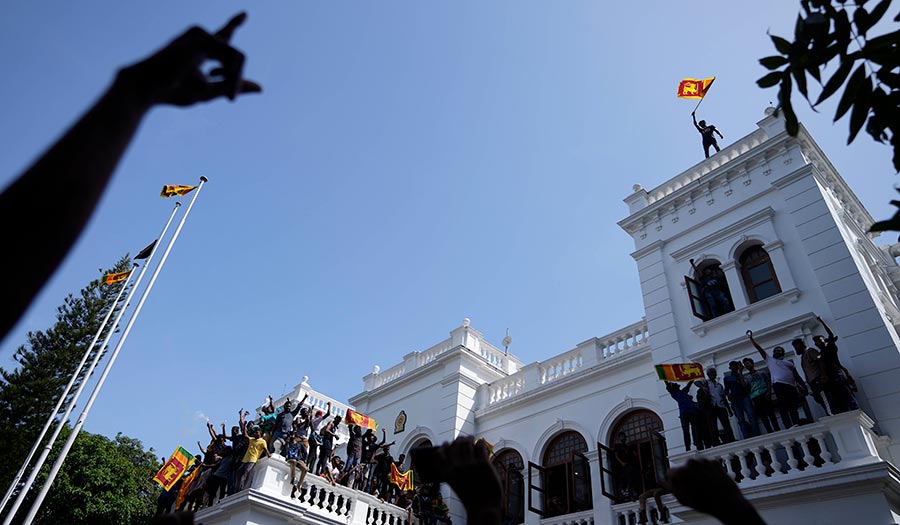 AP/Eranga Jayawardena
AP/Eranga Jayawardena
World News Desk
Learn the why behind the headlines.
Subscribe to the Real Truth for FREE news and analysis.
Subscribe NowCOLOMBO, Sri Lanka (AP) – Sri Lanka’s president fled the country without stepping down Wednesday, plunging a country already reeling from economic chaos into more political turmoil. Protesters demanding a change in leadership then trained their ire on the prime minister and stormed his office.
President Gotabaya Rajapaksa and his wife left aboard an air force plane bound for the Maldives—and he made his prime minister the acting president in his absence. That appeared to only further roil passions in the island nation, which has been gripped for months by an economic meltdown that has triggered severe shortages of food and fuel.
Thousands of protesters—who had anticipated that Prime Minister Ranil Wickremesinghe would be appointed acting president and wanted him gone—rallied outside his office compound and some scaled the walls. The crowd roared its support and tossed water bottles to those charging in.
Dozens could later be seen inside the office or standing on a rooftop terrace waving Sri Lanka’s flag—the latest in a series of takeovers of government buildings by demonstrators seeking a new government.
“We need both…to go home,” said Supun Eranga, a 28-year-old civil servant in the crowd. “Ranil couldn’t deliver what he promised during his two months, so he should quit. All Ranil did was try to protect the Rajapaksas.”
But Mr. Wickremesinghe, who declared a state of emergency, appeared on television to reiterate that he would not leave until a new government was in place—and it was not clear when that would happen. Although he fled, Mr. Rajapaksa has yet to resign, but the speaker of the parliament said the president assured him he would later in the day.
Police initially used tear gas to try to disperse the protesters outside the prime minister’s office but failed, and more and more marched down the lane toward the compound. As helicopters flew overhead, some demonstrators held up their middle fingers.
Eventually security forces appeared to give up, with some retreating from the area and others simply standing around the overrun compound. Inside the building, the mood was celebratory, as people sprawled on elegant sofas, watched TV, and held mock meetings in wood-paneled conference rooms. Some wandered around as if touring a museum.
“We will cook here, eat here and live here. We will stay until [Wickremesinghe] hands over his resignation,” said Lahiru Ishara, 32, a supervisor at a supermarket in Colombo who has been a part of the protests since they kicked off in April. “There’s no other alternative.”
Over the weekend, protesters seized the president’s home and office and the official residence of the prime minister following months of demonstrations that have all but dismantled the Rajapaksa family’s political dynasty, which ruled Sri Lanka for most of the past two decades.
On Wednesday morning, Sri Lankans continued to stream into the presidential palace. For days, people have flocked to the palace—swimming in the pool, marveling at the paintings and lounging on the beds piled high with pillows.
At dawn, the protesters took a break from chanting as the Sri Lankan national anthem blared from speakers. A few waved the flag.
Protesters accuse the president and his relatives of siphoning money from government coffers for years and Mr. Rajapaksa’s administration of hastening the country’s collapse by mismanaging the economy.
The family has denied the corruption allegations, but Mr. Rajapaksa acknowledged some of his policies contributed to the meltdown, which has left the island nation laden with debt and unable to pay for imports of basic necessities.
The shortages have sown despair among Sri Lanka’s 22 million people and were all the more shocking because, before the recent crisis, the economy had been expanding and a comfortable middle class was growing.
The political impasse has only added fuel to the economic disaster since the absence of an alternative unity government threatened to delay a hoped-for bailout from the International Monetary Fund. In the meantime, the country is relying on aid from neighboring India and from China.
More on Related Topics:
- Myanmar’s Civil War Has Seen a Devastating Increase in Attacks on Schools, Researchers Say
- India Begins to Flex Naval Power as Competition with China Grows
- China’s Population Falls for a 2nd Straight Year as Births Drop Even After End of One-Child Policy
- Asia Lags Behind Pre-Pandemic Levels of Food Security, UN Food Agency Says
- China Is Building Up Its Nuclear Weapons Arsenal Faster Than Previous Projections, U.S. Report Says


